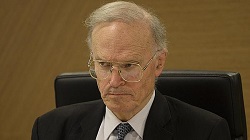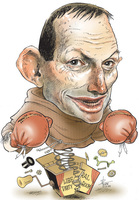1. Away for a while
Four of the Bahnisch siblings and their partners have decided to meet up and invade Europe again. Back in 2008 it was the Rhine, this time the centre-piece is a trip down the Danube, if it has any water in it. I’ll be away from 8 September to 13 October.
This time I think it best for the blog to lie fallow. John D has been busy doing good works, and there are no other active bloggers to keep the site going.
I’m expecting my posting to taper in the coming week. We’ll see.
2. National Reform Summit
I think the idea may have come from former Labor minister Craig Emerson and Nick Cater, the Director of the Menzies Research Centre. The National Reform Summit was sponsored by The Australian, The Australian Financial Review and KPMG and everyone that mattered was there – business groups, community groups, the unions, addressing all manner of social and economic issues, and apparently reaching furious agreement.
Laura Tingle says the key question is now how the debate now feeds back into politics. My feeling is that the ideological fissures will again reappear as we get back to sound bites and point scoring.
Joe Hockey said we can’t go into the future looking out of the window od a Holden Commodore. I’d just like a government with its hands on the wheel. Hockey said consumers will lead the way.
Martin Parkinson said we are sleepwaliking into a real mess if we don’t get a grip.
Roy Green and John Hamilton Howard tell us what we need to do to ensure Australia remains an innovative nation.
3. Border Force farce
I couldn’t believe what seemed to be going on. Something called Border Force. People who looked like cops. Stopping people at random on the street to see whether their visa was in order!
Here’s an explanation:
In July, the Australian customs and border protection merged with the department of immigration and border protection and launched the Australian border force, whose officers have substantially greater powers than either customs or immigration officials. They are permitted to carry guns and have powers to detain.
Under the Migration Act, an authorised officer can ask for information from someone the officer “knows or reasonably suspects is a non-citizen”.
The information can include evidence of being a lawful non-citizen and personal identity papers. The person must comply with the request within a time period “specified by the officer”.
If the officer “knows or reasonably suspects” the person is an unlawful non-citizen the officer must detain that person.
In effect the immigration system was being militarised.
Any way it seems to have stopped before it started.
That was 1600 years ago on 24 August:
Tuesday marks the 1,600th anniversary of one of the turning points of European history – the first sack of Imperial Rome by an army of Visigoths, northern European barbarian tribesmen, led by a general called Alaric.
It was the first time in 800 years that Rome had been successfully invaded. The event had reverberations around the Mediterranean.
It must have seemed like the end of the world at the time.
5. Gillard supports same sex marriage equality
Gillard has been getting a bit of a razz for saying that she now supports same sex marriage. A bit bloody late, they say.
Actually she’s repeating what she said in her book some time ago. Her position has been misunderstood, by people who either don’t listen or hear only what they want to hear. There is a statement in the link, but let me try again.
Gillard as a young feminist saw the institution of marriage as hopelessly patriarchal and wanted it nixed in favour of civil unions. She would do nothing to support the institution.
She has come to realise that history has spoken. The institution of marriage will endure and even be cherished. That being the case she now recognises that it should be open to all.
She has been seen as strangely conservative, or sucking up to conservative interests, whereas she was actually more radical than most.
Introduction to Saturday salon
Because of the way the blog currently presents posts on the home page I think it’s better to remove the introductory material to a different place. For new readers, here’s the rationale for this space.

An open thread where, at your leisure, you can discuss anything you like, well, within reason and the Comments Policy. Include here news and views, plus any notable personal experiences from the week and the weekend.
For climate topics please use the most recent Climate clippings.
The gentleman in the image is Voltaire, who for a time graced the court of Frederick II of Prussia, known as Frederick the Great. King Fred loved to talk about the universe and everything at the end of a day’s work. He also used the salons of Berlin to get feedback in the development of public policy.
Fred would only talk in French; he regarded German as barbaric. Here we’ll use English.
The thread will be a stoush-free zone. The Comments Policy says:
The aim [of this site] is to provide a venue for people to contribute and to engage in a civil and respectful manner.








